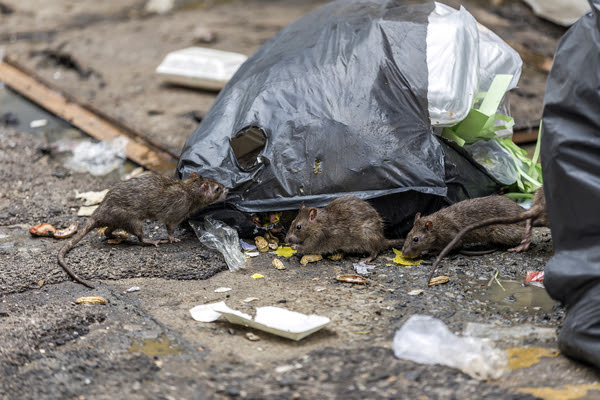
Rats will eat almost anything! From grains and fruits to scavenging on meat, their adaptable diet poses unique challenges for effective pest control. Keep reading to discover the varied eating habits of rats in this comprehensive guide. From their preferences in the wild to their attraction to human food, learn how understanding their diet is key to effective pest control.
What Rats Eat in the Wild
In the wild, rats have an omnivorous diet. They consume a variety of foods based on their natural habitat and what’s available. Their diet typically includes:
- Grains
- Fruits
- Vegetables
- Seeds
- Insects
- And more.
Rats are opportunistic feeders, adapting their eating habits to the resources present in their environment. Their ability to consume both plant and animal matter contributes to their survival and success in various ecosystems.
Foods That Attract Rats to Homes
Certain foods can attract rats to homes, as they are drawn to readily available sources of nutrition. These include:
- Leftover Pet Food: Open bowls or spilled pet food can attract rats.
- Grains and Cereals: Unsecured pantry items like grains and cereals are enticing.
- Fruits and Vegetables: Overripe or discarded fruits and vegetables can attract rats.
- Garbage: Uncovered trash cans or improperly sealed garbage bags are a food source.
- Compost: An open compost bin with food scraps can be attractive to rats.
- Bird Seed: Rats may be lured by spilled birdseed or poorly stored bird feed.
- Nuts and Seeds: These can be appealing, especially if stored improperly.
- Garden Produce: Rats may target fruits and vegetables in gardens.
- Leftover Human Food: Any accessible human food, especially in open areas, can attract rats.
Need An Estimate for Rodent Control?
How Do Wild Rats Find Food?
Rats use a combination of their keen senses, primarily their sense of smell, to locate food. Their excellent olfactory abilities help them detect even small traces of food from a distance. Additionally, rats are known for their resourcefulness and ability to memorize locations, allowing them to revisit places where they’ve found food before. They may also follow established paths or use their whiskers to navigate in the dark. Rats are highly adaptive and persistent in their search for food, making them successful scavengers in various environments.
Foods That Are Toxic to Rats
While rats are known for their adaptability and ability to consume a wide range of foods, there are certain items that they should avoid. Foods that are toxic to rats include:
- Chocolate: Contains theobromine, which is harmful to rats.
- Sweets and Sugary Foods: Excessive sugar can lead to health issues.
- Processed Foods: High salt and preservatives can be harmful.
- Citrus Fruits: The acidity may upset their digestive system.
- Raw Beans: Contain toxins that are harmful if not properly cooked.
- Green Potatoes: Contain solanine, a toxic substance.
- Raw Onions and Garlic: Can be harmful in large quantities.
How to Keep Rats Out of Your Food
To keep rats out of your food, follow these preventive measures:
- Secure Storage: Store food in airtight containers to deny rats easy access.
- Regular Cleaning: Clean up crumbs and spills promptly to remove potential food sources.
- Secure Trash Bins: Use tightly sealed trash cans and dispose of garbage regularly.
- Pet Food Management: Do not leave pet food exposed; store it in sealed containers.
- Proper Compost Handling: If you compost, use closed bins and avoid adding cooked food.
- Seal Entry Points: Close off gaps and cracks in walls, doors, and windows to prevent rat entry.
- Regular Inspections: Check food storage areas for signs of rats and address issues promptly. Regular professional pest control inspections are also recommended.
- Elevate Bird Feeders: Keep bird feeders elevated and clean to avoid attracting rats.
- Limit Outdoor Food: Avoid leaving human or pet food outdoors for extended periods.
- Use Rat-Proof Bins: Employ trash bins that are difficult for rats to open.
Rat FAQs
Do rats eat insects?
Yes, rats do eat insects. Rats are opportunistic omnivores, and their diet includes a variety of food sources, including insects. Insects can provide an additional protein source for rats, especially in the wild or when scavenging for food.
Can rats eat wood?
No, rats do not eat wood as a significant part of their diet. They may gnaw on wood for teeth maintenance, marking territory, or gathering nesting material, but it is not a primary food source.
Prevent Rat Infestations With Griffin Pest Solutions
Preventing rat infestations requires secure food storage, cleanliness, and sealing entry points. Partner with Griffin Pest Solutions, serving Kalamazoo MI for over 93, for reliable pest control, including rodent management. Call for a free quote today!
Back to Rodent Exterminators – Rat & Mice Exterminators